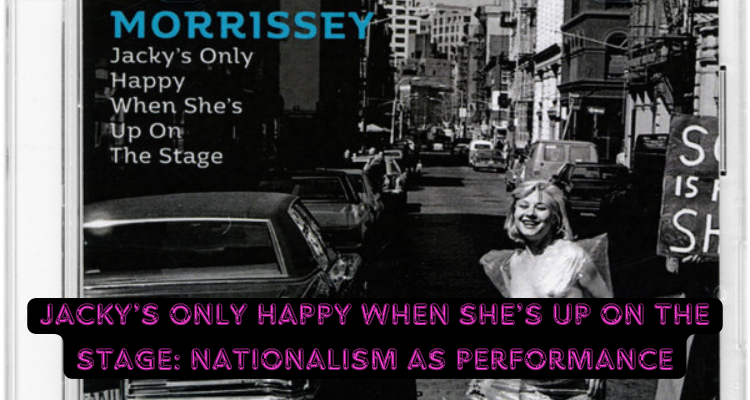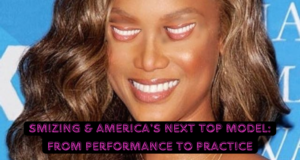Jacky’s Only Happy When She’s Up On The Stage is one of Morrissey’s most brutal and precise dissections of nationalism as a symptom rather than an ideology.
Jacky is not a true believer—she is a performer, someone who has experienced a traumatic rupture with the Real and now clings to nationalism not out of conviction, but as a coping mechanism. She doesn’t believe—she acts as if she believes.
She is determined to prove
How she can build up the pain
Of every lost and lonely day
Jacky’s nationalism doesn’t emerge from a rational ideology—it emerges from pain, loss, and a fundamental lack.
- She has experienced a rupture, an encounter with the Real—something too overwhelming, too traumatic, too destabilizing to confront directly.
- Instead of dealing with it, she performs a new identity, covering the wound with rituals, spectacle, and politics.
- She builds up the pain into something public, visible, theatrical—because if she lets herself stop performing, she might have to face what she’s really missing.
This is the function of ideology in psychoanalysis—it is never just about belief, but about filling a void, covering up an unbearable truth.
Racism as a Performance of Identity
Cue lights! I am singing to my lover at night
Scene Two: Everyone who comes must go
Scene Four: Blacker than ever before
Scene Six: This country is making me sick
The structure of this verse mimics a theatrical production—a series of acts, not spontaneous beliefs. Jacky’s nationalism isn’t deeply felt—it’s scripted.
- Her racism isn’t organic—it’s performative, a way to align herself with a group that gives her an identity.
- Blaming immigrants, racial minorities, or outsiders is an easy way to redirect her pain outward, rather than looking inward.
- The phrase “Blacker than ever before” isn’t just a racial reference—it’s a description of Jacky’s own state of mind—she is growing darker, more consumed by this performance.
- By the final scene, she can’t sustain it anymore—“This country is making me sick”—her nationalism, instead of healing her, has become overwhelming.
Nationalism, like any ideology, can provide temporary jouissance—a kind of perverse enjoyment—but eventually, it breaks down under its own contradictions.
The Big Other, Sexual Neglect, and Nationalism as a Symptom
Jacky cracks when she isn’t on stage
See the effects of sexual neglect
Here’s the core of the problem—Jacky’s nationalism is not about politics but about desire.
- She doesn’t know what she wants.
- Instead of confronting this void, she projects her frustration outward.
- Nationalism, like many ideological structures, becomes a substitute for real desire, a way to experience jouissance without having to deal with her own lack.
This is why nationalism is so effective. It is not just a belief—it is a way to channel anxiety, frustration, and sexual repression into a structured, socially acceptable form.
No script, no crew, no auto-cue
No audience telling her what to do
Exit, exit
Once Jacky can no longer perform, she collapses.
- She can only function if there is an audience, a narrative, an external confirmation of her role.
- When that is taken away, she is left alone with herself—and that is unbearable.
- Her final words—“Exit, exit”—suggest an end, a breakdown, an inability to continue without the ideological fantasy sustaining her.
Conclusion – Nationalism as a Failed Substitute for Desire
Jacky is not a monster. She is not an ideologue, not a true believer, not even a nationalist in the deepest sense. She is a person who has lost something fundamental—love, meaning, identity—and is trying to fill that void through performance.
Nationalism, for her, is not a solution—it is a symptom.
But, as the song makes clear, symptoms do not last forever. The moment Jacky stops performing, she collapses. And this is the hidden truth of nationalism: It isn’t real. It’s just a stage play that people put on to distract themselves from what they’re really missing.



